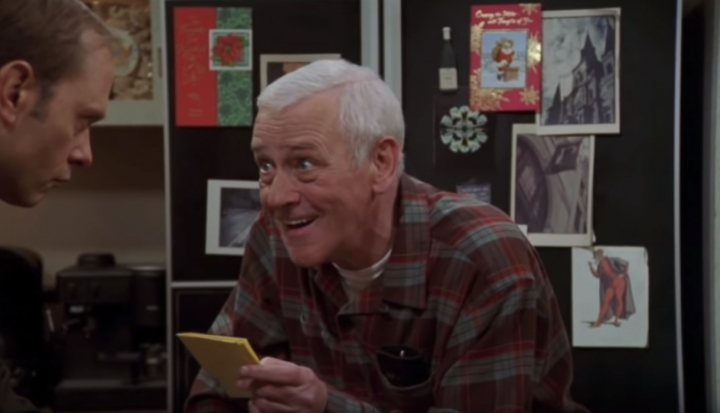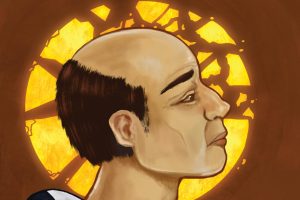In Say Anything, Cameron Crowe’s seminal movie about love and trust in relationships, lovesick good guy Lloyd Dobler hoists his iconic boom box above his head to openly declare his love for Diane Court with a serenade of the dreamy “In Your Eyes.” At the slumber party I’m attending as a 12 year old, we all swoon. And when the strict and manipulative father to Diane impedes the star-crossed lovers, we collectively boo. “Has he no heart? Let them love each other!” my tweenage friends and I hiss.
The nuances of love—parental, romantic, platonic, self—were lost on a gaggle of preteens at a slumber party in the ’90s. Now that I’m an adult—and a parent—I have more compassion for Diane’s dad, thanks to the actor who played him, John Mahoney.
I recently rewatched Say Anything while folding my toddler’s laundry and was surprised to have a new take on an old favorite. In the hands of Mahoney, the father character is layered—strict but loving, authoritative but flawed, devoted but thieving. He falters, he overreacts, he stubbornly demands instead of compassionately listening. But at the core his actions revolve around one purpose: to protect his daughter. The father’s story isn’t about good versus evil; it’s about trust, understanding, trying and failing, and most of all, forgiveness.
When John Mahoney succumbed to complications from throat cancer and brain disease in February 2018, I felt compelled to find out more about the man behind the “non-villain” in a favorite movie. What I learned is that the world lost not only a talented and nuanced performer but also an introspective and deeply connected person of faith.
Growing up in Manchester, England, Mahoney enjoyed acting in school plays. Decades later, he sought to scratch that creative itch by taking an acting class with David Mamet. In 1977, at age 37, Mahoney quit his medical editor job to give acting a shot, joining Steppenwolf Theater, a renowned troupe in Chicago, and started collecting awards and nominations for his craft. He landed plum stage roles, then TV spots, and soon enough Hollywood called, bearing parts in Oscar-winning Moonstruck (1987), Say Anything (1989), and a slew of others. By 1993, he landed his most widely known role as Martin Crane, the lovable curmudgeon on NBC’s Frasier, earning him an Emmy nomination and a spot on the list of favorite TV dads.
However, before he was the domineering dad, before he was Martin Crane, before he was an actor at all, John Mahoney was driven by his actions as they relate to others. He took care and purpose to make sure his behavior in the everyday centered on charity and kindness. In a conversation with a friend, Mahoney reportedly said, “I have a little mantra that I say probably 20 or 30 times throughout the day: ‘Dear God, please help me to treat everybody—including myself—with love, respect, and dignity.’ That’s why it’s important for me to be liked.”
The need to be liked makes sense for an actor—but the need to be spiritual? Reading about Mahoney’s openness about his faith and spirituality surprised me because it feels less common from a famous person. In fact, we think of actors as wearing masks; they are who we want them to be. But here was a successful actor and thespian who convincingly brought dimensions and facets to his characters because of his clear-eyed conviction in his own actions.
Little was reported on his personal life, but from what he shared, John Mahoney was a man of deep thought and purposeful care for how he connected with others. Like his professional calling, Mahoney claimed that his attention to his personal spirituality evolved over time, with deliberate thoughtful action.
In Cathleen Falsani’s book, The God Factor: Inside the Spiritual Lives of Public People (Farrar, Straus and Giroux), Mahoney says he was self-centered. “I thought the world revolved around me. It even affected my work when I became an actor. I used to think about how great I had to be and how wonderful I had to be on that stage instead of honoring the playwright or honoring the screenwriter and becoming a part of something that was wonderful.”
After a personal epiphany about his place in the world, Mahoney made the personal decision to live more closely to his faith and values. “I made a conscious effort to be a better person, to be a part of the world, and to try to revolve around everyone else in the world instead of expecting them to revolve around me.”
As someone who struggles with the distinction of being spiritual but not religious, this dedication to simply “be better for others” is an inspiring thing to hear and emulate. I may not say my prayers each night or attend Mass, but I can strive to be better for others.
What resonates the most is Mahoney’s candor about struggling with perception and personal insight. It’s easy to say, “I care about other people,” but putting it into action in difficult moments takes concerted effort. I can be quick to curse at a dangerous driver. I get impatient with dawdling lines at the store. I get frustrated by the laundry that needs folding and the independent toddler who won’t fall asleep. It’s not pretty, and I don’t like it about myself. But as Mahoney shows, taking the situation and finding a way to be generous of spirit toward others—and myself—can be my own way to reframe a situation to something more kind and understanding.
How? To put it into action each day. For Mahoney, a regular prayer habit kept him in a gracious frame of mind, like a tether to a boat. Whenever his actions or thoughts drifted toward unkindness or selfishness, he used prayer to center himself. For me, I try to acknowledge all of the moments in my life that center me and simply be grateful. To sit on my couch, watching an old favorite movie, folding the clothes of my healthy, independent toddler, who brings me so much joy and happiness; I’m grateful for this peaceful, ordinary moment.
Also, Mahoney was quick to point out that he was not without problems or missteps, because that’s true for everyone, famous or not. Mahoney acknowledged his past self-centered behavior, as well as issues with alcohol or unfairness in relationships. But where he faltered, he also forgave himself.
“Yes, you make mistakes. And yes, you do things that you shouldn’t do, but you will be forgiven, and you will be loved, and you won’t be loved less,” he said. You will be loved just as much as you were before you made the mistakes.”
Though it’s not written in the script this way, this is essentially the talk Mahoney’s character has with Diane Court in Say Anything, when Diane says she’s worried she’ll make the wrong choice. Even when he played the bad guy, Mahoney was imbuing his personal faith into his characters.
Remembering to think of how others feel or reframing an unpleasant situation isn’t a new concept, nor is it especially profound. But it’s a good reminder during the frustrating parts of our daily lives. And John Mahoney, an actor who infused his roles with care, nuance, and understanding, serves as a good example.
This article also appears in the November 2018 issue of U.S. Catholic (Vol. 83, No. 11, pages 45–46).
Image: Youtube














Add comment